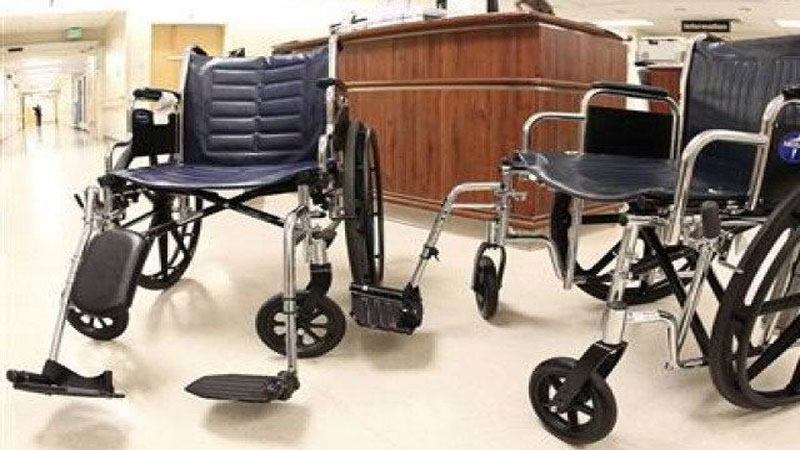WHILE at long last Pakistan’s tribal and transgender populations have been brought into the mainstream through legislative reform, one social group has still been left behind.
This was recently spotlighted at the launch of a report titled Bringing Disability in the Constitutional Net. Speaking at the event, the PPP’s Farhatullah Babar underscored the need for political will to mainstream persons with disabilities.
Let us then examine our legislative scorecard in recent years.
There has been little to no progress since Pakistan ratified the UN Convention on the Rights of PWDs in 2011. Though the 18th Amendment’s passage offered a timely opportunity to overhaul the Disabled Persons (Employment and Rehabilitation) Ordinance, 1981, most provincial governments — including Mr Babar’s own party in Sindh — chose to enact the ordinance with minor changes.
Based on an outmoded approach, these laws frame PWDs as pitiful victims in need of charity, not inclusion. But disability is not an issue that affects only a few; whether through birth, accident, illness or old age, it touches all of us.
Accounting for this, the CRPD defines ‘disability’ as “long-term physical, mental, intellectual or sensory impairments which in interaction with various barriers may hinder [PWDs’] full and effective participation in society”.
It outlines a social model that requires nations to guarantee PWDs’ rights through affirmative policies, and remove environmental and institutional barriers.
Two recent developments could make an argument for such legislation to be enacted at the federal level. One is the recently passed Transgender Persons (Protection of Rights) Act, a progressive law that extends to the whole of Pakistan.
Though it will likely require further provincial assent on devolved subjects for uniform service provision, it serves as a template for harmony between such future laws.
The second is the precedent set by the Supreme Court’s judgement upholding the federal Industrial Relations Act, 2012. The court found that, though labour is a provincial subject, Entry 32 of the Federal Legislative List enables the federal government to enact laws to implement international treaties (in IRA’s case, several ILO conventions).
Thus, the CRPD could also be legislated at the national level, effectively ensuring conformity in defining disability, guaranteeing legal protection from discrimination, and providing a holistic, rights-based framework to guide the drafting of better laws and implementation mechanisms by the provinces.
Let us hope, then, that our next elected representatives are able to shed their benign apathy for decisive action.
Published in Dawn, June 12th, 2018
For more live updates, follow Dawn.com’s official news Instagram account@dawn.today
Experts demand law for mainstreaming of disabled persons
https://www.thenews.com.pk/print/328705-experts-demand-law-for-mainstreaming-of-disabled-persons
Islamabad : A holistic law dealing with the welfare and mainstreaming of Persons Living With Disabilities (PWDs) can be a great leap forward. The will to do so has to come from political parties, which are presently finalizing their manifestoes for the upcoming elections. The participation of PWDs in different spheres of life will significantly increase if they are brought in the national mainstream.
These suggestions were floated at the Oxfam-sponsored launch of the report ‘Bringing Disability in the Constitutional Net,’ by Potohar Mental Health Association (PMHA), an organisation working for the wellbeing of PWDs.
PPP’s Secretary General Farhatullah Babar said, one way in which PWDs can be truly taken care of is by “mainstreaming” them. It is about taking steps that make them equal citizens of the country, a goal which is otherwise not realized due to exclusionary practices. Sharing examples from his own stint as senator, Babar said that other marginalized groups such as tribal areas residents and transgender were brought in the mainstream by parties and the Parliament taking proper political and constitutional steps.
Exclusion of PWDs can also be overcome, Babar said, calling for passing a comprehensive law that covers welfare of PWDs. The existing law is outdated and deals only with employment of PWDs. Terming political will as decisive factor, Babar disclosed that Pakistan People’s Party will take care of PWDs in its manifesto, which is to be unveiled soon, and called upon other parties to do so.
Earlier, PMHA’s President Zulqurnain Asghar lamented that the absence of any law means absence of any binding document to ensure that all rights of the PWDs, in specific, are upheld, and violators are held accountable. He also wondered as to how come the 2017 census showed a decline of PWD population, while population of the country in general has increased. Government data about PWDs is consistent, the report noted.
Noreen Khan, Assistant Director Legal at Baitul Maal, touched upon the barriers from society towards PWDs. The mindset of people, she said, needs to be changed. Babar too called for empathy in reaching out to PWDs. “The able-bodies”, he said, “should realize that physical disability can strike anyone with any time with any intensity.” If this is understood, there can be feelers of empathy, he said.
Taking part in the discussion, Amjad Nazeer and Maliha Hussain, working with different non-government organisations, pointed the need for taking special measures to ensure that the vote of a PWD is registered without any hassle and that they are provided with infrastructure facilities at polling stations.
Oxfam’s Gender and Justice Programme Manager Hadia Nusrat said PWDs face numerous challenges and only through meaningful participation in the democratic process can they voice their concerns and ensure the safeguarding of their rights. She also appreciated the role of a special cell in the Election Commission of Pakistan, which is taking care of PWDs, and hoped that these efforts would generate more awareness.
Political parties urged to include disabled persons in manifestos
Participation of persons living with disabilities in different spheres of life will significantly increase if they are brought in the national mainstream and a holistic law dealing with their welfare can be a great leap forward. Besides, political parties, which are currently preparing for the upcoming general elections, should include them in their manifestos.
These suggestions came at the report launch of ‘Bringing Disability in the Constitutional Net’ by the Potohar Mental Health Association (PMHA), an organization working for the wellbeing of the persons living with disabilities.
PPP’s Secretary General Farhatullah Babar said that one way in which such persons can be truly taken care is by ‘mainstreaming’ them. It is about taking steps that make them equal citizens of the country, a goal which is otherwise not realized due to exclusionary practices, he said.
Sharing examples from his stint as senator, Babar said that marginalized groups such as residents of the tribal areas and the transgender community were brought in the mainstream by parties and parliament taking proper political and constitutional steps. Exclusion of such persons from the mainstream society can be overcome, he said, calling for passing a comprehensive law that covers their welfare.
The existing law is outdated and deals only with employment of the persons with disabilities, he said. Terming political will as a decisive factor, Babar claimed that his party, Pakistan People’s Party, will take care of such persons in its manifesto, which is to be unveiled soon. He called upon other parties to also follow the suit.
Earlier, PMHA President Zulqurnain Asghar, sharing details of the report, lamented that the absence of any law means absence of any binding document to ensure that all rights of the disabled persons in specific are upheld and the violators are held accountable. He also wondered as to how come the 2017 census showed a decline in the population of persons with disabilities, while population of the country in general has increased. Government data about such persons is consistent, he noted.
Noreen Khan, Assistant Director Legal at Baitul Maal, touched upon the barriers from society towards the disabled persons. The mindset of people, she said, needs to be changed. “The able-bodies should realize that physical disability can strike anyone with any time with any intensity. If this is understood, there can be feelers of empathy,” she said.
Taking part in the discussion, Amjad Nazeer and Maliha Hussain, working with different nongovernment organizations, stressed the need for taking special measures to ensure that the vote of a disabled person is registered without any hassle and that they are provided with infrastructure facilities at the polling stations.
Oxfam Gender Justice Programme Manager Hadia Nusrat said that persons with disabilities face numerous challenges. She said only through meaningful participation in the democratic process, they can voice their concerns and ensure the safeguarding of their rights.
She also appreciated the role of a special cell in the Election Commission of Pakistan which is taking care of the person with disabilities, and hoped that more efforts like this will help create awareness in the society.
Published in Daily Times, June 12th 2018.
Political parties urged to consider persons with disabilities in their manifesto
Report on mainstreaming disabled persons launched
Zubair Qureshi
A holistic law dealing with mentally-challenged people’s welfare can do lot to ensure their rights and welfare and this has to come with consensus from all the political parties as they are currently, busy finalizing their manifestoes for the upcoming elections.
These suggestions came by PPP’s Secretary General Farhatullah Babar at the launch of a report titled “Bringing Disability in the Constitutional Net” here on Monday. Oxfam in Pakistan sponsored the report launch in collaboration with the Potohar Mental Health Association (PMHA), an organization working for the wellbeing of the persons living with disabilities.
Participation of persons living with disabilities (PWDs) in different spheres of life will significantly increase if they are brought in the national mainstream, said Mr Babar adding one way in which the PWDs can be truly taken care of is by “mainstreaming” them.
It is about taking steps that make them equal citizens of the country, a goal which is otherwise not realized due to exclusionary practices. Sharing examples from his own stint as senator, Babar said that other marginalized groups such as tribal areas residents and transgender were brought in the mainstream by parties and parliament taking proper political and constitutional steps.
Exclusion of PWDs can also be overcome, he said, calling for passing a comprehensive law that covers welfare of the PWDs. The existing law is outdated and deals only with employment of PWDs. Terming political will as decisive factor, Babar disclosed that his party, Pakistan People’s Party, will take care of the PWDs in its manifesto, which is to be unveiled soon, and called upon other parties to do so.
Earlier, PMHA’s President ZulqurnainAsghar, sharing details of the report, lamented that the absence of any law means absence of any binding document to ensure that all rights of the PWDs, in specific, are upheld, and those violators are held accountable. He also wondered as to how come the 2017 census showed a decline of PWD population, while population of the country in general has increased. Government data about PWDs is consistent, the report noted.
Noreen Khan, Assistant Director Legal at BaitulMaal, touched upon the barriers from society towards the PWDs. The mindset of people, she said, needs to be changed. Farhatullah Babar too called for empathy in reaching out to PWDs. “The able-bodies”, he said, “should realize that physical disability can strike anyone with any time with any intensity.” If this is understood, there can be feelers of empathy, he said.
Taking part in the discussion, AmjadNazeer and Maliha Hussain, working with different non-government organizations, pointed the need for taking special measures to ensure that the vote of a PWD is registered without any hassle and that they are provided with infrastructure facilities at the polling stations.
Oxfam’s Gender and Justice Programme Manager Hadia Nusrat said that PWDs face numerous challenges and only through meaningful participation in the democratic process can voice their concerns and ensure the safeguarding of their rights. She also appreciated the role of a special cell in the Election Commission of Pakistan, which is taking care of the PWDs, and hoped that these efforts would generate more awareness.

